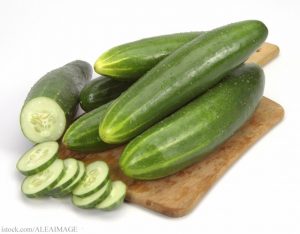In their latest report on the deadly Salmonella Poona outbreak linked to Andrew & Williamson cucumbers imported from Baja, Mexico, the Centers for Disease Control and Prevention (CDC) stated that tests on the outbreak strain shows that 100% of the bacteria are not resistant to antibiotics. That is good news. Still, the hospitalization rate for this outbreak is 31%, which is 11% higher than the usual rate for Salmonella infections.
 There may be two reasons for this discrepancy. First, a large proportion of patients in this outbreak (52%) are children. Because children’s immune systems are still developing, they have a harder time fighting off these types of infections. Second, there may have been so many bacteria on the cucumbers that they overwhelmed patients’ immune systems and caused more serious illnesses.
There may be two reasons for this discrepancy. First, a large proportion of patients in this outbreak (52%) are children. Because children’s immune systems are still developing, they have a harder time fighting off these types of infections. Second, there may have been so many bacteria on the cucumbers that they overwhelmed patients’ immune systems and caused more serious illnesses.
The Food and Drug Administration (FDA) has traced the outbreak back to a farm in Mexico. An import alert has been issued to exclude cucumbers from Rancho Don Juanito de R.L. de C.V. located in Baja, Mexico from import into the United States. FDA traceback investigation determined that the firm was the primary source of cucumbers that were shipped to Andrew & Williamson Fresh Foods. Andrew & Williamson then distributed the cucumbers around the country.
The case count by state is, as of September 14, 2015: Alaska (10), Arizona (72), Arkansas (6), California (89), Colorado (16), Hawaii (1), Idaho (14), Illinois (6), Indiana (2), Kansas (1), Kentucky (1), Louisiana (4), Minnesota (20), Missouri (8), Montana (13), Nebraska (2), Nevada (9), New Mexico (22), New York (4), North Dakota (2), Ohio (2), Oklahoma (10), Oregon (8), Pennsylvania (2), South Carolina (8), Texas (20), Utah (37), Virginia (1), Washington (15), Wisconsin (9), and Wyoming (4). Illnesses started on dates ranging from July 3, 2015 to September 3, 2015. Among 290 people who have been interviewed by public health officials, 91 people (31%) have been hospitalized. Two deaths have been reported from California (1) and Texas (1). This is an increase of 77 cases since the last update on September 9, 2015.
The recalled cucumbers were sold in Alaska, Arizona, Arkansas, California, Colorado, Florida, Idaho, Illinois, Iowa, Kansas, Kentucky, Louisiana, Minnesota, Mississippi, Montana, Nevada, New Jersey, New Mexico, North Dakota, Oklahoma, Oregon, South Carolina, Texas, and Utah. They may have been sold in other states. No distribution list for the cucumbers has been released by Andrew & Williamson or by the government.
We do know that the cucumbers were served in salads to customers of Red Lobster, and that they were sold at select Walmart stores around the country, in deli items at Safeway and Carrs stores in Alaska, at Savemart, Food 4 Less, Winco, and Ralphs. They were also recalled in Canada by the Overwaitea Food Group and Safeway stores. In addition, Custom Produce Sales has voluntarily recalled Fat Boy Brand and unlabeled cucumbers in the United States for possible Salmonella contamination.
The recalled cucumbers are long, dark green slicer cucumbers that were sold in bulk bins in stores with little or no identifying marks. They are about 7 to 10″ long and about 1.75 to 2.5 inches in diameter.
The symptoms of Salmonella food poisoning include diarrhea that may be bloody, abdominal pain and cramps, nausea, vomiting, fever, chills, headache, and muscle pains. Most people get sick a few hours to a few days after exposure to the bacteria. While many people recover on their own, some, especially in this outbreak, become so ill they must be hospitalized. If you ate cucumbers and have experienced these symptoms, please see your doctor.




